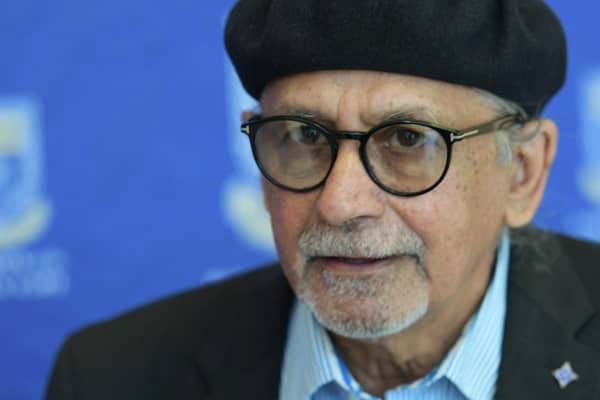Acclaimed South African photographer, cultural activist and jazz promoter, Rashid Lombard, is dead. He was aged 74.
Born on April 10, 1951 in North End, Gqeberha, Lombard, who passed away today, surrounded by his loved ones, moved with his family to Cape Town in 1962.
Originally trained as an architectural draftsman and later as an industrial photographer, Lombard began his career with construction giant, Murray & Roberts. In 1970, he married Colleen Rayson, and both had three children: sons Chevan and Shadley; and daughter, Yana Lombard-Williams.
As a child in the Eastern Cape, Rashid Lombard experienced a diverse, harmonious community—Black, white, coloured, Indian, and Chinese—until the brutal machinery of apartheid forcibly removed his friends to racially segregated areas, “never to be seen or heard of again.”
Lombard’s political consciousness was later amplified through the influence of the Black Consciousness Movement (BCM). He went on to work as a freelance photographer and television sound recordist during the height of the anti-apartheid struggle. His lens captured the unrest and hope of a nation in transition for international media outlets including Agence France-Presse (AFP), BBC, and NBC.
Over the course of his career, he documented pivotal moments in South Africa’s journey to freedom, including the rise of the democratic movement in the 1980s, the release of Nelson Mandela in 1990, and the country’s first democratic elections in 1994. With democracy came the opportunity to fully embrace his other great passion—jazz.
Lombard served as station manager at Fine Music Radio and later as programming manager at P4 Smooth Jazz Radio. In 1997, he founded espAfrika, the events management company behind one of his most enduring legacies: the Cape Town International Jazz Festival, which he launched in 2000 and directed until his retirement in 2014.
After stepping away from the festival, Lombard took over the digitisation of his archives, a task previously managed by Colleen. He later partnered with the National Archives and Department of Sport, Arts and Culture (DSAC) to make the collection publicly accessible online as a national heritage resource. His daughter will now carry this work forward.
A gifted visual storyteller, Rashid Lombard published Jazz Rocks in 2010, edited by the late George Hallett. The book is a journey looking through the eye of his camera—capturing music, people, and places that defined his life and work across the globe. It offers a richly textured window into the vibrant world of jazz, reflecting not only the performances, but also the deep, spiritual connection between Lombard and the musicians he photographed.
More than a photo book, Jazz Rocks is a visual love letter to a culture and a life lived in rhythm.
Lombard’s work received widespread acclaim. He was honoured with numerous awards for both his contributions to news photography and his impact on music and tourism. In 2014, he was awarded the prestigious National Order of Ikhamanga in Silver “for his excellent contribution to arts and culture and his dedication to promoting jazz music that has put South Africa on the map for many jazz enthusiasts around the world.”
In 1986, legendary exiled photographer Ernest Cole, who had not held a camera for over a decade, borrowed Lombard’s and turned the lens on him—a gesture of deep respect and recognition.
Asked in a later interview about his legacy, the jazz promoter responded: “No matter who you are—religion, race, male, female—you can achieve your dreams. I’m a true testament to that.”
Lombard is survived by his lifelong partner, Colleen Lombard, his sister, Fazoe Sydow and his children: Chevan, Shadley, Yana, Zach, and Daniel, and his grandchildren Liya, Aydin-Malik, Oliver, AmirUccio, and Stella Ahed. Hannah, his beloved granddaughter, passed away in 2002.
Rashid Lombard will be buried according to Muslim rites.

